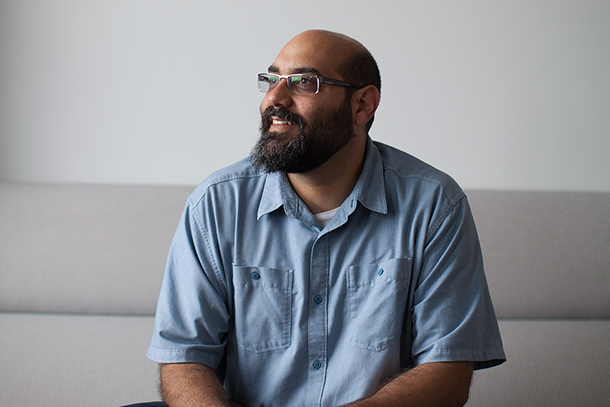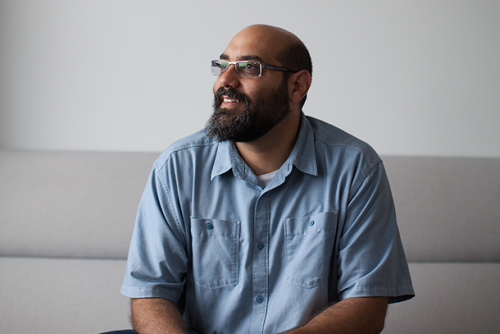
Poetry Faculty Interview: Matthew Shenoda

Matthew Shenoda, Interim Chair, Art and Art History / Professor, Creative Writing
To give prospective and current students some insight into the Poetry MFA program, I’ll be talking with members of the faculty. We kicked things off with Tony Trigilio, followed by CM Burroughs. Matthew Shenoda is up next, with some wonderful advice for poets and prospective students.
How did you discover poetry?
My first introductions to poetry in the general sense were largely through an analysis and deep engagement in musical lyrics. Also having grown up in a tradition where things like the Book of Psalms were a regular part of life, this no doubt influenced me as well. Then, through teachers mostly, I began to discover contemporary poetry, being introduced to both classical texts as well as contemporary works from various movements from the Beats to the Black Arts Movement, the Chicano and American Indian Renaissance of the 60’s and so on.
What brought you to Columbia; what do you think sets us apart?
I came to Columbia initially as the Associate Dean of our School of Fine and Performing Arts, but also held a tenured faculty appointment. After stepping down as Associate Dean and becoming Interim Chair of Creative Writing for a couple years, I had the ability to teach more in our poetry program which has been a great experience. I think one of the things that attracted me to the college in general were the immense possibilities that exist given our unique confluence of being in a very urban and international city coupled with a history of engaging arts and media from a kind of hybrid space of artistic practice and a leaning towards social practice. Though I think we still have plenty of room to grow, the ability to draw from so many cultural spaces in a city like this, and in a college like this one that has a dedication to a more progressive leaning is very exciting to me. I have found working with the young poets here a real yearning to engage work from multiple angles. There is always a sense of connecting the work we are doing in poetry with other art forms and ways of thinking about craft and aesthetics and that, I think, sets us apart. I’ve never felt a sense of stringency in the way we think about our discipline in poetry and this reflected by the fact that we have a very aesthetically diverse faculty.
What is your favorite part about living and working in Chicago?
Chicago still feels quite new to me (5 years) and admittedly I’m still trying to find my niche in the city, but the vibrancy and accessibility, especially to myriad artistic practices stands out to me as a rare and wonderful thing.
What are you reading right now?
I am always reading many books in multiple genres. On the nonfiction side I just finished an academic book called Written/Unwritten: Diversity and the Hidden Truths of Tenure, I imagine a text that may be of little interest to most students; I’ve also just finished Jeff Chang’s We Gon’ Be Alright: Notes on Race and Resegregation, Yvonne Chouinard’s Let My People Go Surfing, Michael Eric Dyson’s Tears We Cannot Stop: A Sermon to White America and have begun reading Lauret Savoy’s Trace: Memory, History, Race and The American Landscape. On the poetry side, so many great books! I have just read, am in the midst of, or am returning to, several newer books of poetry: Aracelis Girmay’s The Black Maria, Kamau Brathwaite’s Strange Fruit, Sun Yung Shin’s Unbearable Splendor, Larry Levis’s The Darkening Trapeze, Natalie Scenters-Zapico’s The Verging Cities, Solmaz Sharif’s Look, Douglas Kearney’s Buck Studies, Brenda Hillman’s Seasonal Works With Letters on Fire, Safia Elhillo’s The January Children, Kwame Dawes’s City of Bones, Ishion Hutchinson’s House of Lord and Commons, Camille Dungy’s Trophic Cascade, Layli Long Soldier’s Whereas, and a whole bunch of manuscripts from young African poets. I also have a stack of novels waiting for me to get into.
Are there writers or collections you find yourself regularly returning to? What brings you back to them?
I read a great deal of poetry and nonfiction and lots of contemporary and new work, so I often feel like I am engaging in a progressive act of reading “forward” as so many books are published each year, but no doubt there are a host of writers I return to. On the academic side I come back to a few theorists, on the poetry side I often return to a great many folks. Lots of Caribbean poets, African poets, Arab poets, and American poets from the generation before mine, there is something about seeing the way they worked out certain things in their time, how they navigated their social and cultural realities that I find very instructive.
There really are far far too many to name. I have never had a favorite collection or a favorite poet. I return to the work that I feel I need in the moment, the work that I feel will help me see the world in a certain way or teach me to hone my craft. Sometimes I know that I am trying to think through a certain idea or a certain problem and in that moment I may say, “Lucille Clifton or Aime Cesaire, or Mahmoud Darwish knew how to tackle this..”
What advice do you have for young poets?
Read. Write. Repeat.
Would you share one of your poems with us?
Happy to. Here are a few poems and an essay that has within it a few poems.
